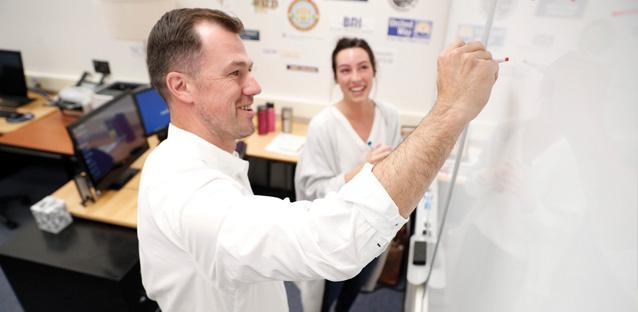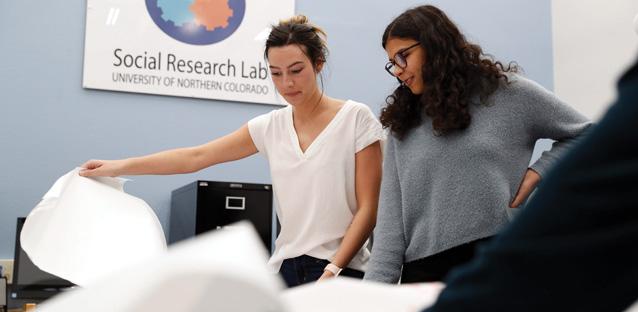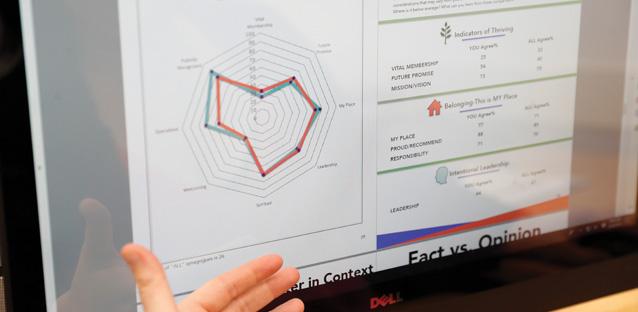The Social Research Lab (SRL) at UNC builds a bridge for students to excel in their careers while connecting the community to professional-level research.
By Amber Medina
If it wasn’t for working at the Social Research Lab then I wouldn’t be on this path now,” says Kim Trevino ’14, ’16. “UNC has such a gem on their hands.”
Trevino is completing her Ph.D. in community analytics at Baylor University and works at the Center for Community Research and Development there. While at UNC, she worked as a graduate assistant in the Social Research Lab.
A self-sustaining, fully-functioning professional research lab, UNC’s Social Research Lab is housed within the Sociology Department. The lab conducts data collection and analysis for local and national for-profit and nonprofit businesses, allowing clients to better navigate their growth, management and planning.
“I learned leadership skills, statistical analysis skills and project management skills and, even though statistical packages and methods might change, the lab gave me the ability to adapt, lead and learn,” Trevino says. “Because of my experience at the lab, I know that I’m a great researcher and that I’ll always be able to use those skills in whatever field I go into.”
Founded in 2007, the Social Research Lab has conducted a wide array of research projects, including market research, focus groups, policy analyses, report writing, program evaluation, surveys, interviews, needs assessments and quality of life studies tailored to the unique needs of individual clients. Among its many clients are the United Way, Lilly Foundation, United Jewish Appeal, The Emmerich Group, National Speakers Association, Let’s Grow Leaders, Boys and Girls Club of America, the City of Greeley, Weld County and state charter schools.
Among its many projects, the lab has provided data to clients seeking to measure employee engagement, leadership efficacy, innovation and growth opportunities, productivity, community health, housing and park use.
“The lab is a really good example of how UNC is ensuring the continued value of a college education,” says Josh Packard, Ph.D., associate professor of Sociology and executive director of the Social Research Lab. “We’re doing the stuff that bridges what our students learn in the classroom and what they are going to face when they get into the real world. It largely is, or what should be, the future of what universities lean into; the understanding, the critical thinking skills, the problem solving; the stuff that our students definitely need and employers want.”

Kim Trevino BA ’14, MA ’16, transferred from Aims Community College to UNC as a non-traditional, first-generation college student from Chicago. She was the first woman in her family to graduate high school. For a long time when she was 13, her family was homeless.
Trevino worked two jobs throughout her undergraduate career. The Social Research Lab hired her as a graduate assistant when she began work toward her master’s degree.
“The lab and Dr. Packard shifted my expectations of how my future would go,” Trevino says. “You just have some professors that change the world for you.”
Trevino now has two master’s degrees and is pursuing her Ph.D. at Baylor University.
“I had so much mentorship and independence working at the lab,” Trevino says. “It was the first time I was in a position of authority to give my opinion on and design projects. It gave me confidence in my abilities.”
Photo by Matthew R. Minard
Megan Bissell ’17, says she has worked at the lab as a paid student worker and an intern, and is now a graduate assistant at the lab working as project manager and lead researcher.
“I’m not a professor. I have a larger investment in it,” Bissell says. “I’m a champion of the lab because I’ve seen for years the impact it has had on students and on our clients. It’s a gateway to advance the field of sociology in addition to it being a great educational experience.”
Since Bissell has been a very consistent and passionate presence at the lab, she and Packard have developed operations processes and systems that have allowed the lab to become more advanced and grow rapidly in the last three years.
“Our processes have become sophisticated enough that we can continue to bring on a higher-level type of client and more complex projects,” Bissell says, “which means having more invested relationships with clients, growing our capacity and getting students exposed to a lot of different things.”
The Social Research Lab serves an education-first mission. This year, dozens of students were involved in 21 research projects and more than 2,700 hours of student engagement and hands-on experience collecting and analyzing data. In addition to the research, students are encouraged to explore their own interests and ideas at the lab. They are present in meetings and on calls with clients, participate in client objective mapping and project management, and author or share authorship of all technical reports.
“The profit we make largely goes right back into students,” Bissell says. “They work at the lab and get paid to learn. It’s like a teaching hospital for research. The overhead that we have is the people we invest in over and over again.”
Hannah Conner ’17 is in her last semester of the Applied Sociology Graduate Program and is a graduate assistant at the lab.
“The SRL’s main goal of educating through hands-on work experience was what pushed me to work there,” Conner says. “The overall sociological lens and the work with a diverse clientele with a broad range of research interests is what has kept me there for the last three years.”
Conner’s work at the lab connected her to an internship at the United Way of Weld County, bridging the path to one of her main academic and professional goals to study housing stability and homelessness. She collected and analyzed data regarding regional resource programming as the CAHPS (Coordinated Assessment and Housing Placement System) Data Analyst Intern.
“Without the lab, I wouldn’t have had the resources or knowledge to provide research expertise on a current community concern,” Conner says. “I hope to use the skillset I’ve learned in assisting others in the community toward preventing and reducing homelessness.”
Packard and Bissell believe experiences like Conner’s represent the lab’s irreplaceable impact.
“In some ways the actual pushing out of the surveys is the least important thing that we do,” Packard says. “It’s this community-building part that is the long-term sustainable value and benefit.”
Guided by Packard and Bissell, students not only learn how to collect and analyze the data, but how to aggregate and present data reports that provide the appropriate feedback for clients to easily digest and use to make informed decisions.
“We’ve created this innovative space where there’s a lot happening that is really forward thinking, very applied and engaged with the community,” Packard says. “Our clients get to do this really great thing; they get to support the university both financially and through student learning outcomes while getting something their businesses sorely need. It’s a huge win.” UNC




